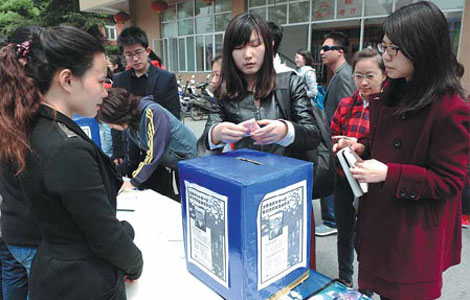Flash quit
Updated: 2013-05-10 08:14
By Shi Jing (China Daily)
|
|||||||||||
High mobility
Meanwhile, it's not just young people from higher academic backgrounds who quit their jobs more frequently than previous generations. Young migrant workers also seem to be adopting a more open attitude toward frequent job changes.
Migrant workers aged 24 or under are now highly mobile, according to a survey conducted by daguu, one of the largest websites providing job information to migrant workers in the weeks following Spring Festival, or Lunar New Year, a traditional time of change.
About 30 percent of the 13,500 respondents said they would not return to the city where they worked before Spring Festival. In addition, 63 percent said they would not return to their pre-holiday employer.
Liu Yiwei works for a government department that helps younger migrant workers find work in Shanghai. In the past three years, she has witnessed an indifference to work and career paths among the young, especially the post-'90 generation.
"Most of the jobs we introduce them to are in the service industry. But they cannot endure the work and quit very quickly, maybe within three to five days. If we ask 20 people to come in for an interview, only 10 of them will actually show up and of those 10, only seven will be recruited. Finally, only three will make it through the probationary period and get the job," she said.
It seems that people are obsessively concerned with "their own age", which may explain why one hears things such as "the post-1980 generation is fallen" or "the post-1990s are decadent".
Zhou Lian, associate professor at the School of Philosophy at Renmin University of China, has examined the reasons behind this apparent fixation.
In his latest book, You Can Never Wake Someone Who Pretends To Be Asleep, Zhou wrote, "The age we live in is especially demanding, because we live in an age where we are so closely related that we cannot be separated for a second. We are loaded down with worries, not because it is the worst of times but because we place all our hopes and despair on the times in which we live."
Cheuk of Hudson has concluded that the same logic should be applied to the jobs market.
"People born in the 1970s used to say that those born in the 1980s are hopeless and now the post-1980 people say those born after 1990 are the 'beat generation'. There is wide discussion on many platforms - Facebook, Twitter or LinkedIn - revolving around finding a solution to this frequent, even frantic, job-hopping. Well, it's probably a process whereby employers and younger employees will have to learn to adjust to each other. These times are different; there are so many opportunities outside, after all," she said.
Related Stories
Program helps mentally disabled get jobs 2013-05-06 07:11
Enterprises offer jobs to prisoners 2013-05-03 18:12
Landing a job for mentally challenged a tough task 2013-05-02 01:21
Taobao creates new job specifications 2013-04-30 01:00
Beijing’s SOEs offer jobs to disabled 2013-04-15 16:01
Jobs for people with disabilities 2013-04-14 09:31
Today's Top News
MOC queries World Bank China business report
Exporters urged to 'optimize'
Producer Price Index continues to decline
India's top diplomat praises cooperation
China urges UK concrete action for ties
Scientists paying more to reach world
Possible EU punitive duties opposed
Japan protests Okinawa report
Hot Topics
Lunar probe , China growth forecasts, Emission rules get tougher, China seen through 'colored lens', International board,
Editor's Picks

|

|

|

|

|

|





